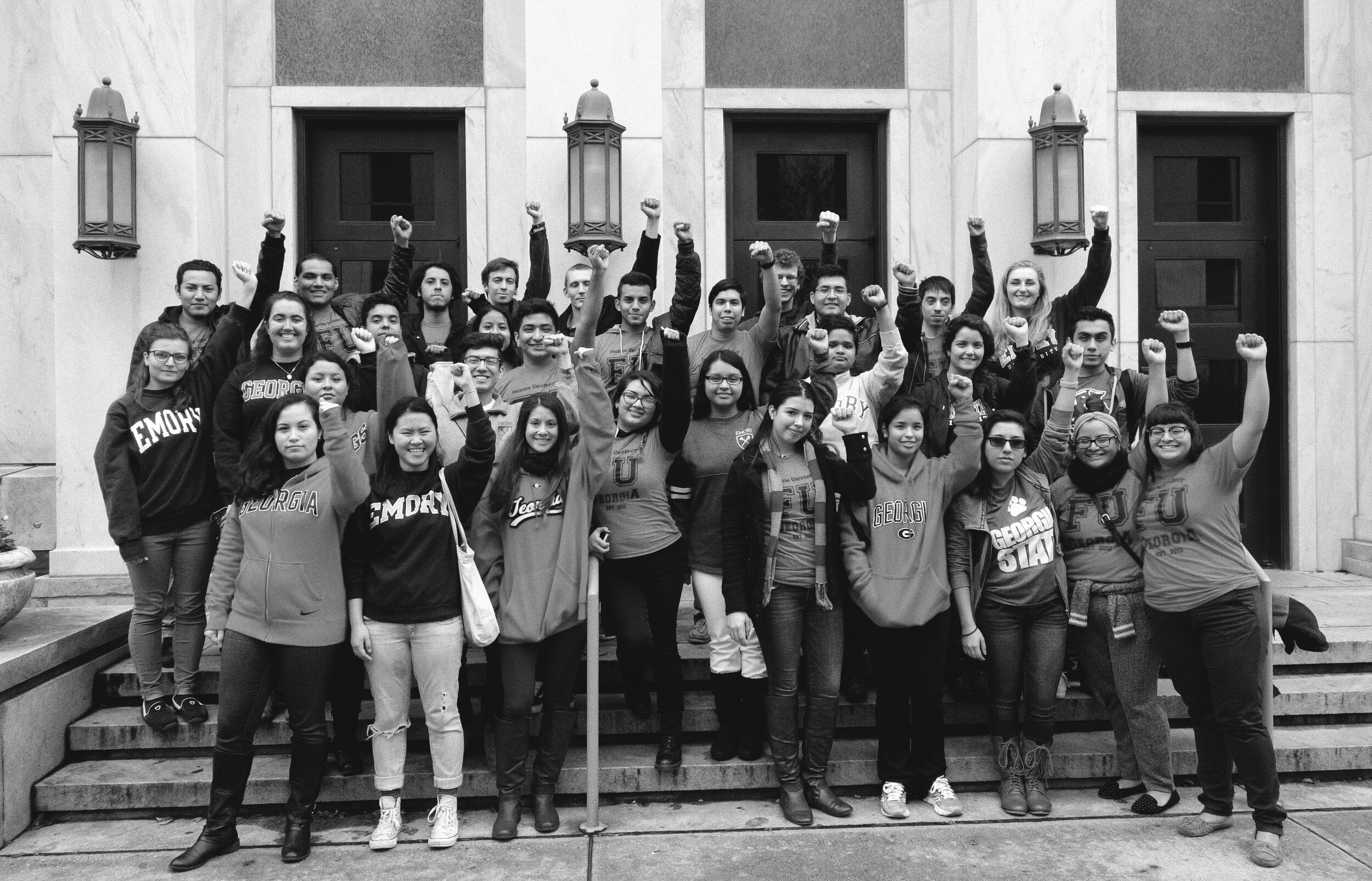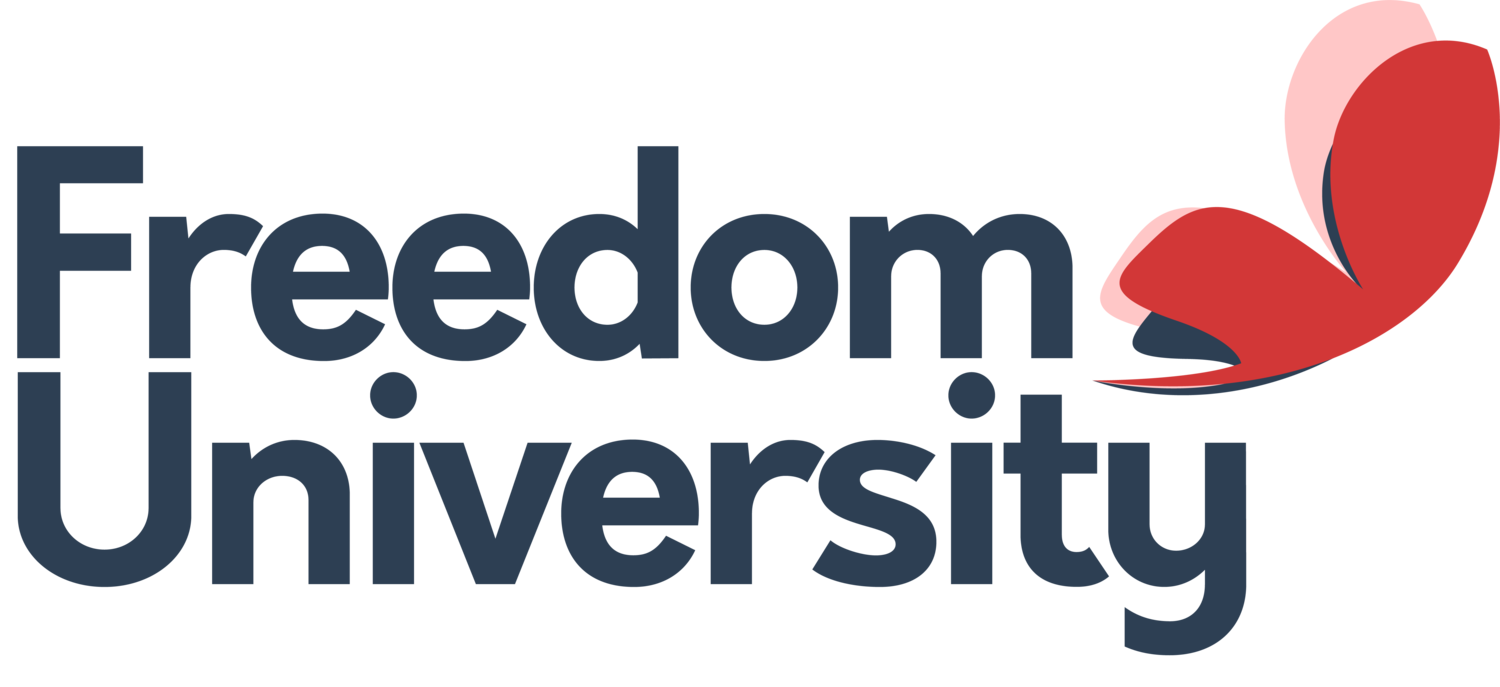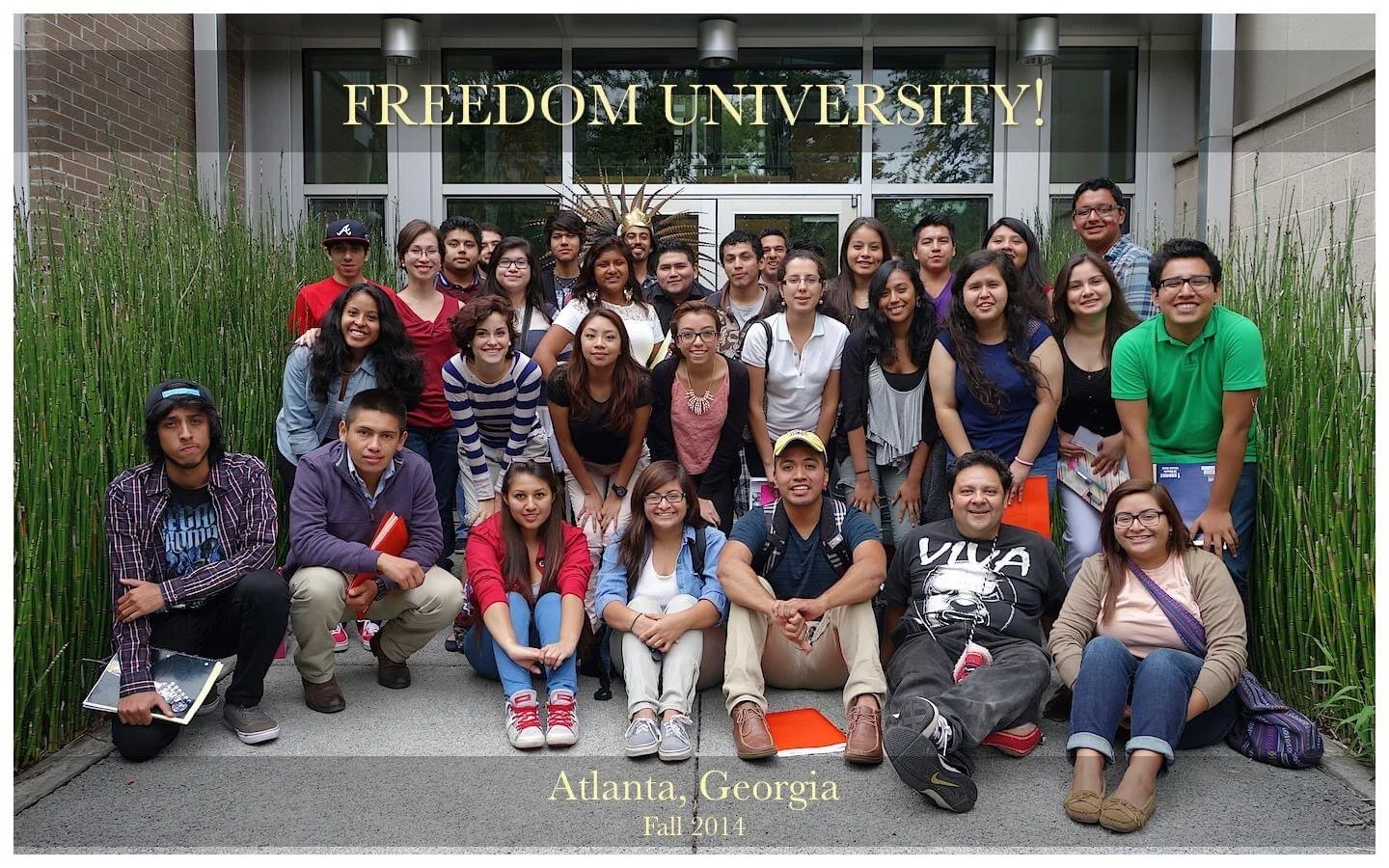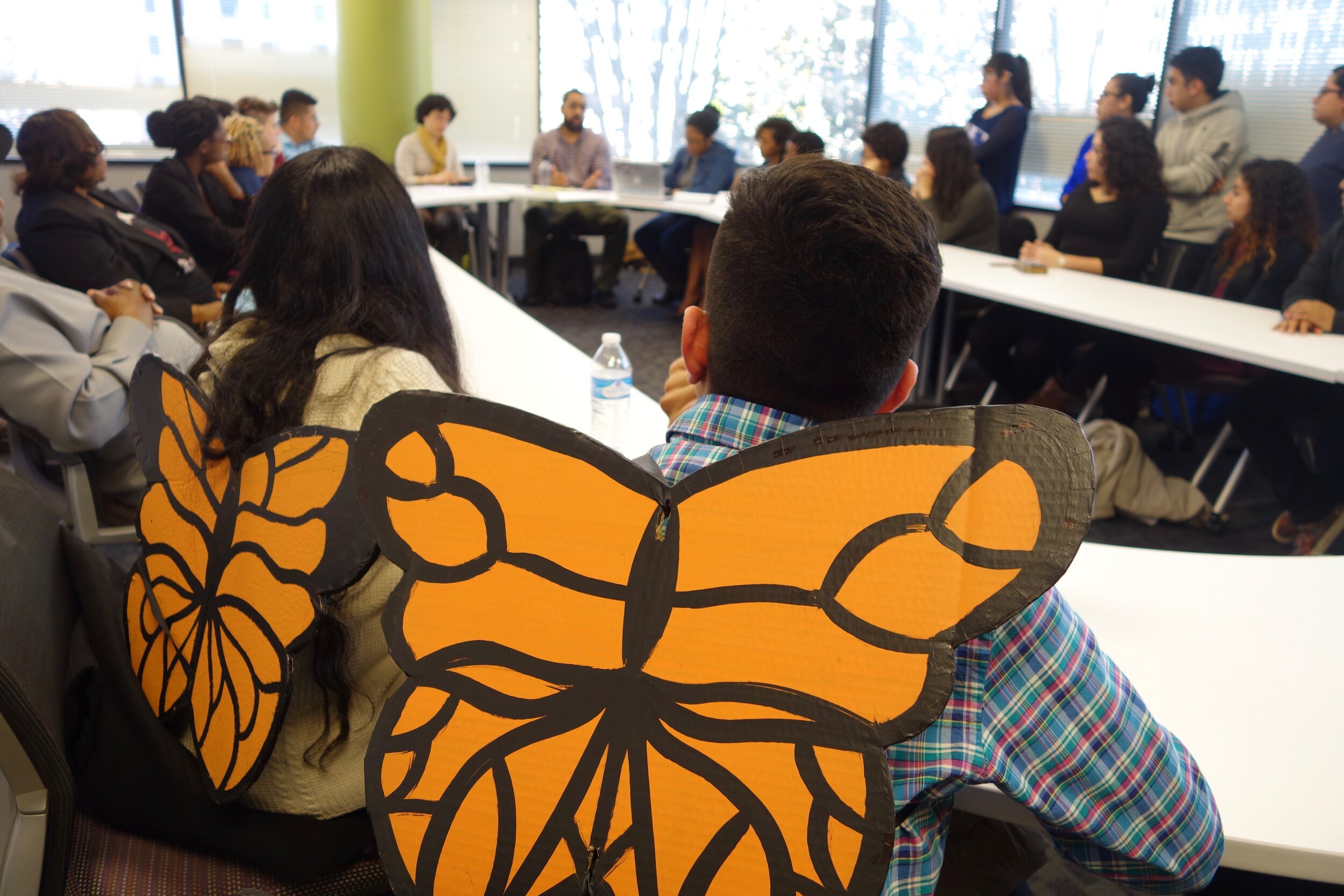
History & Timeline
2010
⎮
Georgia Bans Undocumented Students
In October 2010, the Georgia Board of Regents passes Policy 4.1.6, banning undocumented students from the top five public universities in Georgia (University of Georgia, Georgia Tech, Georgia State, Augusta University, and Georgia College), and Policy 4.3.4, banning undocumented students from in-state tuition rates. Georgia becomes only one of three states - including Alabama and South Carolina - to pass an admissions ban against undocumented students, effectively ushering in a new era of educational segregation in the U.S. South.
⎮
2011
⎮
Freedom University Opens its Doors
In October 2011, Freedom University opens its doors in Athens, Georgia. Freedom University is founded by a broad coalition of undocumented students (including Keish Kim, Georgina Perez, and Gustavo Madrigal), documented student allies (including Allie McCullen, Claire Bolton, and Juan Cardoza-Oquendo), immigrant rights activists (Beto and Noe Mendoza), and four professors at the University of Georgia (Dr. Pamela Voekel, Dr. Bethany Moreton, Dr. Lorgia Garcia-Peña, and Dr. Betina Kaplan). Local organizations such as the Economic Justice Coalition and the Athens Latino Center for Education and Services (ALCES) provide vital support and resources to Freedom University. While the state of Georgia bans undocumented students from public universities, Freedom University provides a safe space where undocumented students can continue their education. Freedom University’s first academic year is an 8-week fall course, “American Civilization I “ taught by the four founding professors.
⎮
2012
⎮
DACA & Freedom University Growth
On June 15, 2012, the Obama administration announces the Deferred Action for Childhood Arrivals (DACA) Program. DACA provides certain undocumented students who meet strict age, residency, and educational requirements with a temporary work permit, a driver's license, and reprieve from deportation, . Hundreds of thousands of undocumented youth across the country apply for DACA, providing fees and sensitive personal and biometric information to the federal government. In exchange, those approved for DACA are able to drive and work with authorization. However, in states like Georgia with admissions bans, DACA did not translate into access to higher education. Despite tremendous barriers to higher education, Freedom University students persist in their commitment to their education. The 2012 curriculum is an 8-week class “Mexican and United States History in Global Perspective” taught by Dr. Pamela Voekel and Dr. Bethany Moreton. With the help of their professors and mentors, Freedom University students begin matriculating into welcoming private universities, such as Tougaloo College, Hampshire College, and Syracuse University.
⎮
2013
⎮
Transitions
In August 2013, professors Pamela Voekel and Bethany Moreton recruit Atlanta-based activist and human rights educator Dr. Laura Emiko Soltis to Freedom University's volunteer teaching team, and hold Freedom University's first classes in Atlanta at the Martin Luther King Sr. Community Resources Complex in the historic Sweet Auburn District. In October, Soltis invites her friends Charles Black and Constance Curry, both veterans of the Atlanta Student Movement and the Student Nonviolent Coordinating Committee (SNCC) who helped desegregate Atlanta in the early 1960s, to speak to her social movements class. In addition to sharing stories and strategies, the movement elders teach Freedom University students freedom songs “We Shall Overcome” and “Oh Freedom” in the style of SNCC, with arms crossed and holding hands. The Spring 2013 and Fall 2013 curriculum each feature two courses.
⎮
2014
⎮
A Year of Transitions: 50th Anniversary of Freedom Summer
In early 2014, the founding professors depart the organization and close Freedom University following the Spring 2014 semester. Dr. Betina Kaplan moves on to establish U-Lead, an educational program for immigrant high school students in Athens, Georgia.
In June 2014, Dr. Laura Emiko Soltis, who had previously served as a volunteer human rights faculty member, takes former Freedom University students to Jackson, Mississippi to participate in the 50th Anniversary of Freedom Summer Conference and begins a mentorship program linking Black Freedom Movement veterans with undocumented student leaders.
In September 2014, Soltis re-establishes Freedom University in Atlanta, Georgia to develop a strong network of allied social justice organizations and set the foundation for future admissions campaigns at Atlanta area campuses. As Freedom University's Executive Director and first full-time staff member, Soltis implements a new horizontal leadership structure by forming a Board of Directors and active Student Committee comprised of elected undocumented student leaders. Soltis recruits faculty from across Atlanta university campuses and expands the curriculum based on student surveys to include classes in human rights, STEM, college preparation, SAT, and arts courses in music, photography, dance, and theater. As a longtime student activist and movement strategist in the South, Soltis also introduces a human rights framework to strengthen Freedom University's advocacy work, develops relationships with other student, labor, immigrant rights, and racial justice movements, and institutes a social movement leadership program to empower undocumented youth.
As a result, Freedom University students are not only learning from top faculty in Atlanta and earning full scholarships to college, they are effectively leading and carrying out a movement strategy to change private university admissions policies and advance equal access to higher education across the United States.
⎮
2015
⎮
Victory at Emory University
Following a year-long campaign, in which Freedom University formed relationships with students and faculty at Emory University and co-founded the Freedom at Emory Initiative with the goal of expanding Emory's admissions policy to undocumented students, Emory University announces in April 2015 that it will accept academically-qualified DACA students without discrimination and provide full, need-based financial aid. Emory becomes the first private university in Georgia to publicly accept undocumented students. Expanding on this strategy of educating documented student and faculty allies at private universities, Freedom U partners with allies at Bard College, Smith College, and Soka University. By the end of the following academic year, each university has changed its admission policy to accept undocumented students.
⎮
2016
⎮
A Year of Good Trouble
On February 1, 2016, on the 56th anniversary of the Greensboro Lunch Counter Sit-ins, Freedom University students and more than 70 student allies from 12 universities across the country, integrate classrooms at the University of Georgia, Georgia State, and Georgia Tech in a courageous act of creative civil disobedience. Under Georgia Board of Regents' Policy 4.1.6, undocumented and documented students are banned from learning together in the same classroom. 14 students are arrested and charged with criminal trespassing.
On May 10, 2016, Freedom University students and documented allies take over the Board of Regents' meeting, sit in the Regents' chairs in the boardroom, and hold a student-led hearing on the impact of Policy 4.1.6, calling expert witnesses that include a Georgia State Senator, a human rights attorney, and an undocumented student leader. Seven students are arrested and charged with disrupting a public hearing.
On November 9, 2016, just hours after the election of Donald Trump, 20 undocumented students and faith leaders disrupt the Georgia Board of Regents and hold an interfaith prayer to end modern segregation in Georgia. Three weeks later, the Georgia Board of Regents decides to remove Georgia State University and Augusta University from the five-college ban under Policy 4.1.6.
⎮
2017
⎮
A Year of Sanctuary
Following the inauguration of President Trump, Freedom University takes a national leadership role in the sanctuary campus movement. Freedom University teams up once again with its student and faculty allies at Emory University to form the Emory Sanctuary Coalition, and develops a set of policy standards for campuses committed to protecting undocumented students. In response, Emory announces it will expand its admissions policy beyond DACA recipients to include fully undocumented students. In response to Freedom University's sanctuary campaign, the Georgia Legislature passes HB 37, the first and only anti-sanctuary campus bill in the nation, which punishes any private university for declaring a sanctuary campus status. During the same legislative session, the Georgia Legislature passes a Campus Carry Bill. In Georgia, guns are welcome on public university campuses, while undocumented students are not.
In response, Freedom University develops the MELT ICE Program (the Mass Emergency Lookout Text for Immigration and Customs Enforcement), a SMS beacon to protect undocumented students on university campuses in Atlanta. Freedom University also establishes a Mental Health Program to provide undocumented students with access to free weekly sessions with trained mental health professionals in the Atlanta area.
On September 5,2017, the Trump administration announces the repeal of DACA. Freedom University holds free legal-aid clinics for undocumented students and covers the cost of DACA renewal applications.
⎮
2018
⎮
A Year of Resilience and Affirmation
Despite an increasingly hostile political climate and the uncertain future of the DACA program, Freedom University continues to serve as the only true sanctuary campus in the nation where all of our students are undocumented. In 2018, half of Freedom University’s graduating class receives full scholarships to four-year colleges across the country, a rate that continues to this day as a result of our college preparation program and nationwide advocacy for equal admissions and financial aid support for undocumented students.
With the support of generous funders and the support of its new fiscal sponsor, The Praxis Project, Freedom University is able to provide to its staff members just salaries and benefits that are in line with its social justice mission. Freedom University hires its second staff member, Arizbeth Sanchez, a Freedom University graduate and DACA recipient.
Our commitment to one another and our community’s tangible wins lead to long overdue recognition: Freedom University wins the U.S. Human Rights Network’s Movement Builder Award and the Center for Civic Innovation’s Community Champion Award. For her work revolutionizing human rights pedagogy in the U.S. South, and building interracial and intergenerational solidarity among veterans of the Black Freedom Movement and youth leaders of the Undocumented Student Movement, our Executive Director is recognized as a global Ashoka Fellow.
⎮
2019
⎮
Amplifying Our Voices for Justice and Joy
There is no such thing as people without a voice. There are, however, powerful systems that exclude the voices of the oppressed. In February, Freedom University students and allies participate in a direct action at the Georgia Board of Regents, and nine allies are arrested - including comedian Jordan Klepper. This action, alongside powerful storytelling that amplifies our students’ voices, is later featured in an episode on the Comedy Central series “Klepper” - reaching millions of viewers around the globe. In March, the Atlanta City Council takes a bold step to uplift the voices of undocumented youth by recognizing Freedom University with a proclamation. Students are invited to a ceremony where they address the Atlanta City Council. Despite not being able to vote in elections, Freedom University students practice how to use their voices to influence decisions that impact their lives.
In May, students meet presidential candidate Bernie Sanders in a town hall. Gabriela Solís, Freedom University’s newly hired Student Coordinator, boldly asks Senator Sanders what he will do to protect not only “DREAMers,” but all 11 million undocumented immigrants in the United States. In August, Freedom University hosts a town hall discussion with presidential candidate Julian Castro. In both events, students ask candidates hard-hitting questions regarding their policies on education, immigration, and climate change. When not speaking truth to power, Freedom University students focus on creating joy: whether performing son jarocho at a farmworker march in Florida or building friendships and laughing on college tours across the country.
⎮
2020
↓
Beloved Community in a Global Pandemic
On March 9, 2020, on the 60th Anniversary of the Atlanta Student Movement’s “Appeal for Human Rights,” Freedom University’s undocumented staff members Arizbeth Sanchez and Rafael Aragón publish “An Undocumented Appeal for Human Rights” with the guidance of their Freedom University mentors and the original appeal’s author, Dr. Roslyn Pope. However, news of this historic moment is quickly overshadowed by the COVID-19 global pandemic.
We soon realize that years of building a beloved community that is able to weather storms of uncertainty will get us through. Our community is, after all, familiar with travel restrictions, worrying about parents on a daily basis, and not being able to say goodbye to loved ones when they pass. We immediately conduct a community needs survey and pivot to meet the urgent needs of our students and their families. For 15 weeks starting on March 23, we deliver more than eight tons of food, medical supplies, and PPE to our undocumented students and their families across Atlanta. And with the support of a grant from the Entertainment Industry Foundation and Colin Kaepernick’s Know Your Rights Camp, we provide more than $40,000 in direct cash payments to our students’ families who were ineligible for federal COVID-19 economic relief.
To ensure the health and safety of our community members, we move all of our classes online. While this new format presents challenges, it also presents opportunities: we recruit faculty from around the world, and launch a national Educator Training Program to guide high school counselors and college admissions professionals with the knowledge and tools they need to better welcome, protect, and support undocumented students. Freedom University also formalizes its Legal Support Program in a partnership with Kuck Baxter Immigration to provide free legal representation and the $495 DACA renewal fees for our current students.
In an environment in which undocumented students continue to be systematically excluded and underserved in higher education, Freedom University is providing a valuable model for educational institutions across the country. We are demonstrating the alternative to modern segregation in higher education and showing what is possible: by providing tuition-free classes, legal support, mental health support, and emergency financial aid, we can ensure the well-being and academic success of undocumented students and take one step closer to building a more just and equitable world.












